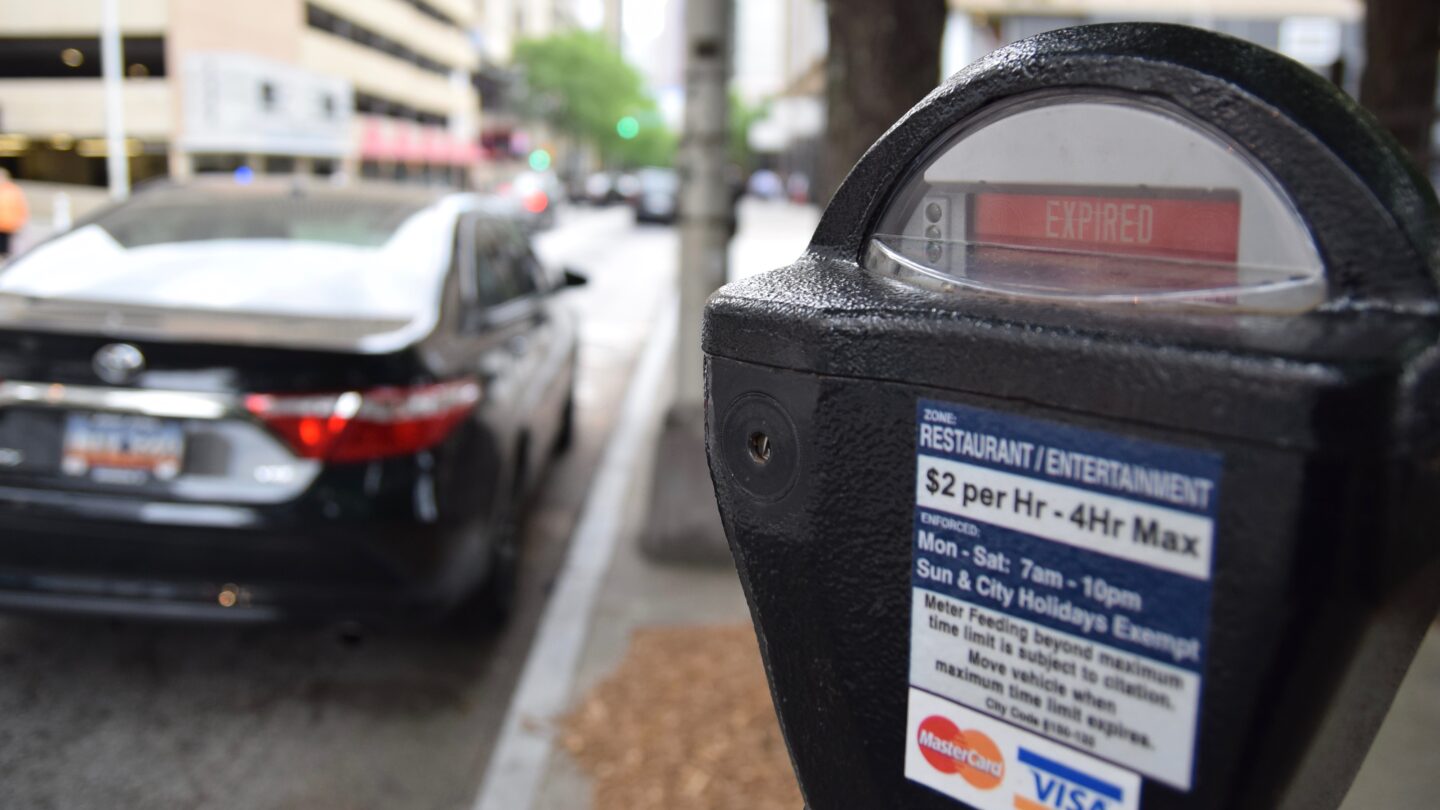Atlanta Weighs Solutions To Drivers’ Parking Meter Angst

Atlanta’s contract with the parking management company PARKAtlanta is set to expire this fall.
While the private company could win a new contract, recent town hall meetings have confirmed that PARKAtlanta has been unpopular among many residents since it took over the city’s parking meters seven years ago. But, as Atlanta considers how it will manage its curbside spaces going forward, the question becomes: what would be better?
Predatory Or Misunderstood?
No one likes getting a parking ticket, but Virginia Highland resident Mike Boyle said PARKAtlanta has gone too far. He said, after the company signed the $35 million deal with the city in 2009, the feel of his neighborhood changed.
“They were everywhere. They call them PEOs in their language ─ the parking enforcement officers,” Boyle said. “And I noticed they were aggressively ticketing. And so I stopped going to some of my local haunts. I felt like I was being watched, and monitored almost, looking for an opportunity to be ticketed.”
After he was ticketed on a broken meter, he had enough. He started a site, Boot PARKAtlanta, against PARKAtlanta. He thinks the private company has a profit motive to write tickets. He believes it’s predatory.
PARKAtlanta said it may seem that way partly because the city-run enforcement agency before them was very lax about following up on tickets. The city had also lost more than half of its officers in the year leading up to PARKAtlanta’s contract, Anderson Moore, vice president of operations at Duncan Solutions, which manages PARKAtlanta, pointed out.
“Perception is that we’ve written more citations, and that’s a big misconception,” said Moore.
“Although there are now three times the meters that were there when PARKAtlanta first started. Per meter, we’re writing less citations than the city did.”
At about 200,000 tickets last year, PARKAtlanta is also writing fewer than parking enforcement agencies in other major cities. San Francisco, for example, writes 1.4 million citations a year – more than six times the number that Atlanta writes – despite only having about double the population of Atlanta.
Parking Meters’ PR Problem
John Van Horn is editor of Parking Today magazine, an industry publication. He hears about the negative reputations of parking management companies all the time.
“Well it’s difficult because the primary issue on all of this is, everyone believes that somewhere in the Constitution or the Magna Carta or something it says that parking should be free,” Van Horn said.
This abhorrence of paid parking is evident in pop culture. In one episode of Seinfeld, George Costanza tells Elaine Benes: “Nobody in my family can pay for parking. It’s a sickness. My father never paid for parking, my mother, my brother, nobody, we can’t do it.”
Van Horn said, “Anytime you charge for parking, you get a pushback. So the parking industry starts off in a negative situation and simply goes downhill from there.”
He said, the decline is especially steep when there’s a change in the rules or a shift in how they’re enforced, as happened during the transition from the city’s team to PARKAtlanta.
Still, many people, Van Horn said, just don’t see the point of charging for street parking – aside from those millions of dollars going to the city.
UCLA professor emeritus Donald Shoup wrote all about that point in his book, “The High Cost of Free Parking.”
Metered parking keeps spaces open, said Shoup, and that prevents people from cruising for parking, which in turn reduces traffic. It also lessens the need for the parking lots that clutter cities like Atlanta.
Lessons From ‘The Parking Guru’
“I think if Atlanta looks around at what other cities are doing,” Shoup said, “like Miami Beach, they’ll find some good models.”
Shoup, sometimes known as the “parking guru,” has thought about how to improve the public’s perception of meters and the people who enforce them.
He said, some cities have noticed that around 5 percent of license plates account for a quarter of all tickets. So they use graduated fines. That means serial violators face steep costs, but those who are unlucky once or twice pay a nominal fee.
“Other cities go even further in that the first violation of the year is a warning. So it really shows that the city is trying to enforce the law but not to raise a lot of money and penalize occasional violators,” Shoup said.
If that idea doesn’t excite local governments, Shoup said cities could also consider charging residents less than tourists, dedicating parking fees to neighborhoods where they’re collected or even transforming meters into free Wi-Fi hubs.
He thinks all of these different efforts could turn around the bad rap that’s stuck with metered parking since it started in the 1930s.
“People thought of parking meters as an infernal combination of an alarm clock and a slot machine. You put your money in and you hope to get back before your time runs out, or you risk a ticket,” Shoup said. “But now I think technology is so good that we can convince people that you pay for parking like you pay for gasoline or anything else.”
Atlanta’s Next Parking Program: Still To Be Determined
In Atlanta, leaders still have some basic questions to answer about the city’s parking meters, said Yolanda Adrean, who leads the City Council’s transportation committee.
They’re going through residents’ complaints, she said, and considering whether a private company, like PARKAtlanta, should continue managing parking or if the city should take it over. They’re also debating whether to maintain the $5 million revenue stream the city currently receives from curb parking.
Asked if she could imagine Atlantans feeling good about parking enforcement, Adrean said, “I can imagine them feeling much better.”
“No one likes to pay for things, right?” Adrean said. ”But we can’t have Alpharetta-style parking in a city. We’re a city, not a suburb.”
The Atlanta City Council and mayor’s office have about four months to decide what Atlanta-style parking is.
9(MDAxODM0MDY4MDEyMTY4NDA3MzI3YjkzMw004))








